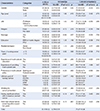Abstract
Purpose
This study aimed to develop and evaluate a nursing educational program improving nursing professional's cultural competency in cancer prevention.
Methods
An eight-hour long educational program was developed based on several preliminary research projects, one ethnography and three quantitative projects, to identify the educational needs among nursing students and professionals in Korea. Thirty two nursing professionals were recruited for a one group pretest-posttest design. Three questionnaires were used to measure cultural nursing knowledge about cancer prevention, cultural competency and perceived importance of nurses' quality.
Results
After completing the educational program, the clinical nurses showed a significant change in the mean score of the cultural nursing knowledge about cancer prevention from 4.78±2.01 to 8.81±1.52 (t=−8.48, p<.001) and the level of the cultural competency from 72.47±8.96 to 83.59±8.61 (t=−6.16, p<.001). Clinical nurses' perception of 'Communication ability with patients and family members' changed from 6th to 2nd most importance but 'Having a passion for the patient care' remained the most important perceived factor of nurses' quality after completing the educational program.
Figures and Tables
Table 1
General Characteristics of the Subjects, Level of Cultural Nursing Knowledge about Cancer Prevention and Cultural (N=32)

Table 2
Mean Changes of the Scores of Cultural Nursing Knowledge about Cancer Prevention and Cultural Competency (N=32)

Table 3
The Change of the Importance of the Nurses'Quality (N=32)

References
1. Palos GR. Celebrating ONS's 40th anniversary and its commitment to cultural competency, diversity, and inclusiveness. Clin J Oncol Nurs. 2015; 19(2):228–229.

2. Yeo TP, Phillips J, Delengowski A, Griffiths M, Purnell L. Oncology nursing: educating advanced practice nurses to provide culturally competent care. J Prof Nurs. 2011; 27(4):245–254.

3. Campinha-Bacote J. The process of cultural competence in the delivery of healthcare services. Transcultural C.A.R.E. Associates;Accessed June 05, 2016. http://transculturalcare.net/the-process-of-cultural-competence-in-the-deliveryof-healthcare-services/.
4. Choi KS, Lee WS, Park YS, Jun MH, Lee SY, Park YW, et al. The relationship between the cultural competency and the importance of nurse's qualities perceived by undergraduate nursing students. J Korean Acad Community Health Nurs. 2016; In press.
5. Korean Nurse Association(KNA). Definition of nursing. 2016. Accessed June 1. http://www.koreanurse.or.kr/about_KNA/definition.php.
6. Stegman BC. Cultural competence integration in the nursing curriculum. Ann Arbor, MI: ProQuest Dissertations Publishing;2013.
7. Neiville S, Goetz C. Transcultural or multicultural nursing? Aust Nurs J. 2012; 20(2):36.
8. Dayer-Berenson L. Cultural competencies for nurses: impact on impact on health and illness. 2nd ed. Burlington, MA: Jones & Bartlett Learning;2014.
9. Government of Western Australia Department of Health. WA Health Multicultural Health Initiatives. Accessed June 1, 2016. http://www.health.wa.gov.au/multiculturalhealth/docs/multicultural_health_initiatives.pdf.
10. Racher FE, Annis RC. Respecting culture and honoring diversity in community practice. Res Theory Nurs Pract. 2007; 21(4):255–270.

11. Kim HK. Health status and associated health risks among female marriage immigrants in Korea. Korean J Health Educ Promot. 2010; 27(5):79–89.
12. Düsseldorf: H-H-U;Accessed Jun 1, 2016. http://www.psycho.uni-duesseldorf.de/abteilungen/aap/gpower3/download-and-register. G*power.
13. Koran Nurse Association(KNA). Korean nurses' declaration of ethics Seoul. South Korea: Korean Nurse Association;Accessed Jun 1, 2016. http://www.koreanurse.or.kr/about_KNA/ethics.php?mn=3#s2.
14. Choi KS, Morgan , S , Thongpriwan V, Lee SY, Jun MH. A proposed teaching model to improve cultural competency care for undergraduate Korean nursing students. J Korean Acad Soc Nurs Educ. 2014; 20(3):424–434.

15. National Cancer Information Center(NCIC). Cancer Screening: National Cancer Information Center. Accessed Jun 1, 2016. http://www.cancer.go.kr/mbs/cancer/subview.jsp?id=cancer_010202000000.
16. American Cancer Society(ACS). Healthy Choices for Breast Cancer Prevention & Screening Booklet. Accessed Jun 1, 2016. http://acskohls.org/stay-well/choicesfor-breast-cancer-prevention-screening-booklet/.
17. Choi KS, Lee WS, Park YS, Jun MH, Lee SY, Park YW, et al. The evaluation of a teaching model for improving undergraduate nursing students' cultural nursing competency. In : Conference of the Korean Academic Society of Nursing Education; May 27, 2016; Seoul, South Korea: The Korean Academic Society of Nursing Education.
19. Cowan DT, Wilson-Barnett J, Norman IJ. A European survey of general nurses’ self assessment of competence. Nurse Educ Today. 2007; 27(5):452–458.

20. Choi KS, Kim HS, Lee SY, Dressel A, Galvao LW, Jun MH. A study of the curriculum of global health education. J Korean Acad Soc Nurs Educ. 2016; In press.
21. Choi KS, Jun MH, Dressel A, Thongpriwan V. Experiences of Korean-American women who have taken screening and testing for early cancer detection. In : Proceedings of Conference of the Korean Academic Society of Nursing Education; May 27, 2016; Seoul, South Korea: The Korean Academic Society of Nursing Education;2016. 05. 27.
23. Kim RM. Educational needs for cultural nursing competences and cultural competence of Korean nurses. Suwon: Ajou Univ;2015.
24. Korean Institute for Healthy Family(KIHF). Contents for multiculture education curriculum for instructor. Accessed Jun 1, 2016. http://www.alio.go.kr.
25. Hunter JL, Krantz S. Constructivism in cultural competence education. J Nurs Educ. 2010; 49(4):207–214.

26. Jeffreys MR, Dogan E. Evaluating cultural competence in the clinical practicum. Nurs Educ Perspect. 2013; 34(2):88–94.

27. Daley CM, Filippi M, James AS, Weir M, Braiuca S, Kaur B, et al. American Indian community leader and provider views of needs and barriers to mammography. J Community Health. 2012; 37(2):307–315.

28. American Association of College of Nursing(AACN). Cultural competency in nursing education. Accessed Jun 1, 2016. http://www.aacn.nche.edu/education-resources/cultural-competency.




 PDF
PDF ePub
ePub Citation
Citation Print
Print


 XML Download
XML Download